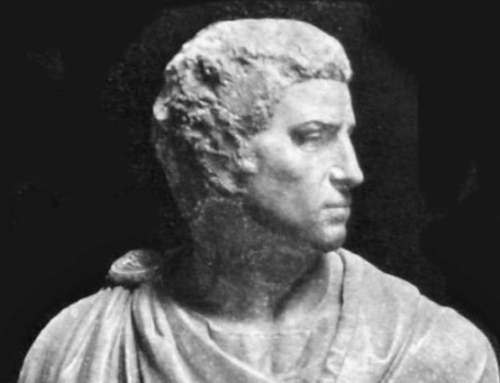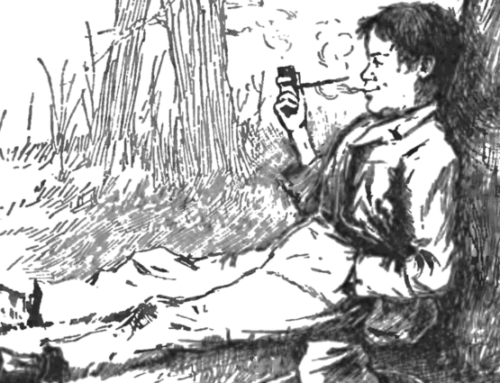The virtuous soldier is prudent in military matters, possessing a love for the homeland. The one who serves virtuously does so with perseverance and honesty. A soldier who takes virtue to heart is not only a valiant servant to the nation. The virtuous soldier is also a faithful servant of God.
 Today’s celebration of Veterans Day honors those who have served in our nation’s armed forces. Those in the military undergo extensive training. Skills are developed, reflexes are tested, strength is challenged, and limits are stretched. In the end, the vigorous training prepares the soldier to face the enemy without fear, defending the homeland honorably. But what is it that sustains the soldier at the core? Virtue. According to Saint Thomas Aquinas, virtue is “a good quality of the mind in which we live righteously” (Summa Theologicae II-II, q. 55, a. 4, obj. 1). In St. Thomas’s treatise on the virtues, he examines the four cardinal virtues of prudence, justice, fortitude, and temperance, as well as several virtues that are associated or allied with the cardinal virtues. Among these are certain virtues that form the soldier for service. Developing such virtues makes the soldier serve valiantly and courageously.
Today’s celebration of Veterans Day honors those who have served in our nation’s armed forces. Those in the military undergo extensive training. Skills are developed, reflexes are tested, strength is challenged, and limits are stretched. In the end, the vigorous training prepares the soldier to face the enemy without fear, defending the homeland honorably. But what is it that sustains the soldier at the core? Virtue. According to Saint Thomas Aquinas, virtue is “a good quality of the mind in which we live righteously” (Summa Theologicae II-II, q. 55, a. 4, obj. 1). In St. Thomas’s treatise on the virtues, he examines the four cardinal virtues of prudence, justice, fortitude, and temperance, as well as several virtues that are associated or allied with the cardinal virtues. Among these are certain virtues that form the soldier for service. Developing such virtues makes the soldier serve valiantly and courageously.
The virtue of prudence is the application of right reason to action. Associated with this virtue is what St. Thomas calls military prudence. Military prudence is a species of the cardinal virtue of prudence; it is a true and full act of prudence, though it is carried out in a specific way. The soldier exercises military prudence by reasoning rightly when confronted with “hostile attacks” (ST II-II, q. 50, a. 4). When such decisions are directed toward the common good, they are acts of prudence. This is especially true for commanders leading their forces (ST II-II, q. 50, a. 4, ad 3). Soldiers must be decisive, working for the good of their company and country. Military prudence ensures that such decisions are carried out rightly.
Justice is the cardinal virtue of giving to one what is his due. When discussing the virtue of justice, St. Thomas considers the potential parts of justice: virtues that are associated with justice, though with a debt that is so great, one can never fully satisfy it. One of these potential parts is piety. While piety is usually associated with religious devotion, St. Thomas defines piety as that which “pays duty and homage to our parents and country,” calling our country “a principle of being” (ST II-II, q. 101, a. 3, corp. and ad 3). Our country is our homeland. Just as parents raise children in the home, nurturing them and caring for them in a way that can never be fully repaid, a person’s country nurtures its people into good and noble citizens, who will care for their country and their fellow countrymen. Those who defend their country exercise piety, offering service to the homeland for a debt that can never be fully repaid.
The virtue of fortitude is a firmness to bear difficulties, especially those things that present certain dangers. Among the parts of fortitude is perseverance, which means “to persist long in something good until it is accomplished” (ST II-II, q. 137, a. 1, corp.). The soldier will face many challenges, both in training and in battle. War tests the combatant’s abilities, including the resolve to keep going. Perseverance allows the soldier to continue moving forward, not falling back, but staying committed to the mission until it is accomplished. A soldier who perseveres is faithful until the end.
Finally, the virtue of temperance helps us to partake of good things in moderation, keeping our passions in check. Among the integral parts of temperance, St. Thomas lists honesty. Honesty has a deeper aspect here than simply being truthful, as it refers to the overall virtuous character of a person. It relates to temperance since through it, one turns away from the things that are “most disgraceful and unbecoming to man” (ST II-II, q. 145, a. 4, corp.). For St. Thomas, “a thing may be said to be honest through being worthy of honor,” which “is due to excellence” (ST II-II, q. 145, a. 1, corp.). The honest soldier is a person of valor, standing up for what is right and decent. Such virtue instills in the soldier strength of character to ward off any distractions from fulfilling one’s mission.
The virtuous soldier is prudent in military matters, possessing a love for the homeland. The one who serves virtuously does so with perseverance and honesty. Virtue sustains the soldier to face any fear, and to stand strong in duty and valor. A soldier who takes virtue to heart is not only a valiant servant to the nation. The virtuous soldier is also a faithful servant of God.
Republished with gracious permission from Dominicana (November 2020)
The Imaginative Conservative applies the principle of appreciation to the discussion of culture and politics—we approach dialogue with magnanimity rather than with mere civility. Will you help us remain a refreshing oasis in the increasingly contentious arena of modern discourse? Please consider donating now.
The featured image is courtesy of Pixabay.







Leave A Comment